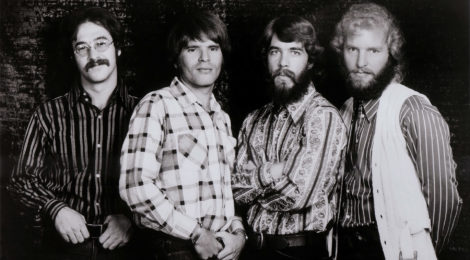
John Fogerty and Saul Zaentz

Creedence Clearwater Revival was one of the most popular American rock bands from the late 1960s to the early 1970s. Songs like ‘Proud Mary’, ‘Suzie-Q’, ‘Fortunate Son’, ‘Who’ll Stop The Rain’, ‘Bad Moon Rising’, ‘Up Around The Bend’, ‘Down On The Corner’, ‘Green River’ and a string of Americana defining-anthems which have been celebrated and featured predominantly in movies, especially portraying this particular period in history, and also many TV adverts. In business terms John Fogerty, the writer, singer and lead guitarist for the band, CCR, produced a catalogue that was BIG money. Songs that would be worth hundreds of millions to the writer. Deservedly so.
In my life, Bad Moon Rising was the third song I learned to play on guitar. John wrote at least a dozen classics
But then he became the target for the bottom feeding scum that are drawn to the music business.
Saul Zaentz (1921 – 2014) was an American film producer and former record company executive. Some of his most famous film productions include One Flew Over The Cuckoo’s Nest (1975), Amadeus (1984) and The English Patient (1996), among others. A big Harvey Weinstein style success story within the Hollywood milieu.
After serving in the US Military during WWII Zaentz started getting involved in the music industry as a salesman and manager for the jazz-oriented record label Fantasy Records.
In 1967 Zaentz and other partners purchased the label from founders Max and Sol Weiss. The partners signed the rights to Creedence Clearwater Revival (CCR), fronted by former Fantasy warehouseman John Fogerty.
Soon after signing for Fantasy Records, Creedence released their eponymous album which featured their classic ‘Suzie-Q’. According to a John Fogerty’s interview by Ross Fortune in 1997 (the one mentioned at the beginning of the article):
… At our record label, Fantasy, we were treated like a doormat. Jazz was more important to them, we were just some schmucks that made rock’n’roll… but we were selling 99 point something per cent of their records, and we’re talking about hundreds of millions of dollars, so it really made me angry.’
On top of that the band’s contract with the label, which Fogerty himself was held to when the band split-up, was something more than just “surrealistic” to put it bluntly. In Fogerty’s own words taken from the same interview:
I owed them 36 new masters for each year. In other words, three albums a year if you put 12 tracks on an album – which most people didn’t – and any of the quotas that weren’t fulfilled in any calendar year slid over into the next year. In 1969, our most prolific year, we put out three albums, but even that wasn’t 36 masters…’
By 1972, at the time of Fogerty’s first solo release Blue Ridge Rangers the contract binding CCR owed (Fantasy Records) more than a dozen albums.
It was undo-able, it was just unthinkable. I started out with all good intentions, took a few steps and realised, man, this is too heavy for me to carry…’
What came after that was what The Guardian (online) described in an article a few years ago as “The Saddest Story In Rock”. As a consequence of all these tribulations John Fogerty became practically a recluse for many years, broken by a deficient legal system, involved in never-ending litigation forced on him by his former manager, whom he never chose as manager in the first place, Saul Zaentz, by now in total control of Fantasy Records.

All the money that Fantasy had paid us – our life savings basically – was put into a financial plan that we were steered into, and there came a time when I wanted to leave the plan because it was looking shadier and shadier to me. It was looking unethical and immoral, but it was also starting to look illegal, and I was told by my accountant, ‘You’ll end up having to pay 140 per cent in taxes’ – in other words, 40 per cent more than I earned or had! So I finally said, ‘You’ve got to get me out of this and retrieve my money.’ … Well, as soon as that message was sent to the bank – Boom! Bomp! … The whole thing folded and disappeared, and we lost all our money.’
As a consequence Fogerty sued a variety of lawyers and accountants, this time successfully, since the band was able to recover part of the money… through an insurance company, who stole all that money and kept it for themselves.
Problems for John Fogerty continued; he spent an entire decade fighting a legal battle against the worst of American legal process. A crushing end to his artistic ambitions.
In the late 1980s, in order to liberate himself from the legal claims of Fantasy Records he agreed to give up all subsequent royalties which could be related to any sales involving any Creedence Clearwater Revival’s material.
In Fogerty’s words ‘I traded my past for my future’.
Having spent all his money in taxes and legal fees John Fogerty continued with his solo career the best way he could. By this time (1985) he released his long awaited comeback entitled Centerfield in which he purposefully took a couple of swipes at Zaentz in a couple of songs, ‘Mr.Greed’ and ‘Zanz Kant Danz’, the latter promoted with a video featuring a dancing pig who turns out to be a pickpocket.
Zaentz reacted predictably. By writ. Subsequent litigation came as no surprise, excepting for John Fogerty, who not-so-unwittingly declared ‘all I did was write a song about a pig’, and -boy oh boy- was he right about that; Zaentz attorneys claimed that the song “defamed his client, holding him up to contempt, scorn and ridicule”.
Fogerty was obliged to take a commercial view and there was an out-of-court agreement to change the name to ‘Vanz’ in future releases of the album.
That was not the end of the Zaentz persecution. What followed was horrific by any standards of legal malice. Saul Zaentz accused Fogerty of having “stolen” one of his own songs ‘Run Through The Jungle’. A 100% Fogerty composition once recorded with Creedence that Zaentz claimed the rights to. A nonsense, as the writer was Fogerty and that right can never be 100% taken in copyright law. The “copycat” song was intended to be one of Fogerty’s newest tracks in the Centerfield album entitled ‘The Old Man Down The Road’. Zaentz sued Fogerty for having “plagiarized himself”. Illegally. It was always Fogerty’s IP. The law suit was a nonsense that forced legal bills on Fogerty, which could not be claimed back under American Law. Fogerty in his own words again:
I won the case… The Jury voted that I didn’t steal my own song, but the judge didn’t award me the legal fees. I won, but it cost me $1,500,000 to prove that I was right!’
By the time this 1997 interview took place Fogerty had neither legal nor financial claim on any of the Creedence songs he had written and performed during the band’s period. He was even betrayed by his own broither and ex-bandmates when they decided to sell their rights back to Zaentz in 1989, just when Fogerty had managed to regain some artistic control of his own music for future Creedence Clearwater Revival’s releases.
They didn’t even care about their own music… They don’t honour it, they don’t want to preserve it. It wasn’t even enough money to matter; it was a paltry amount… it was like a dagger through the heart.’

In 1990, his brother Tom Fogerty died from respiratory failure following a long struggle with tuberculosis. The five Fogerty boys had been brought up by their single mother in California, and Tom had been Creedence’s rhythm guitarist. Coat tailing his talented older brother. Building up resentment.
“Tom ended up over the years evolving mentally into some sort of weird Patti Hearst syndrome,” said John. “That’s what I call it when they kidnap you and you end up siding with your captors, and that’s what Tom did. In some trick of mental agility, he ended up befriending Saul Zaentz against me. By the end of his life Tom was saying ‘Saul is my best friend’. He even wrote me nasty letters saying things like ‘Saul and I will win’. It was very unresolved and very sad.”

Saul Zaentz died at his home in San Francisco at the age of 92, after a long battle with Alzheimer’s disease, on January 3, 2014. Fogerty’s public response after hearing the news was just to tweet his old 1985’s video ‘Zanz Kant Danz’ the song he wrote about the dancing pickpocket-pig.
Bruce Springsteen helped John back to the big stage. Where he belongs. An American songwriting icon laid low for the best part of his creative life by a rotten legal system and a rotten human being. Saul Zaentz.
The best and the worst of America in one story.
If you would like to patronize my writing with PayPal

Comments are closed, but trackbacks and pingbacks are open.